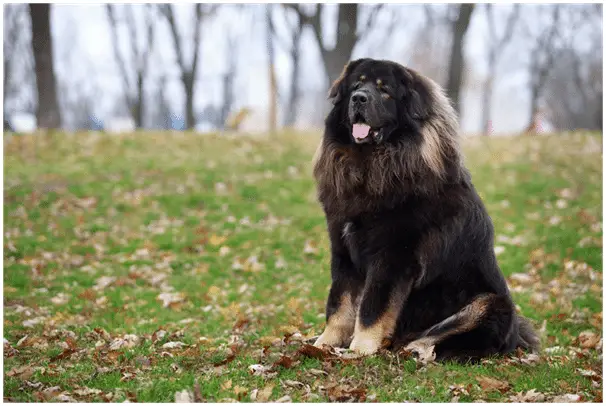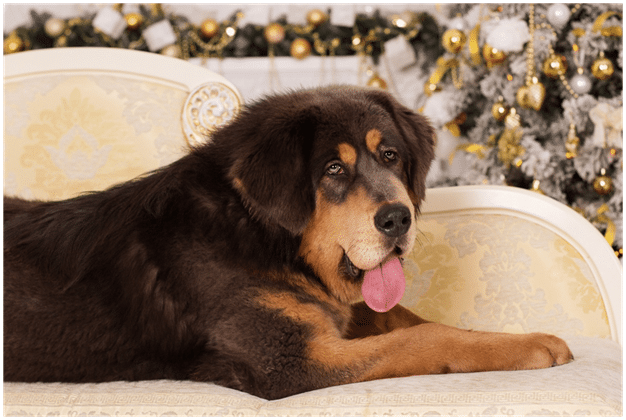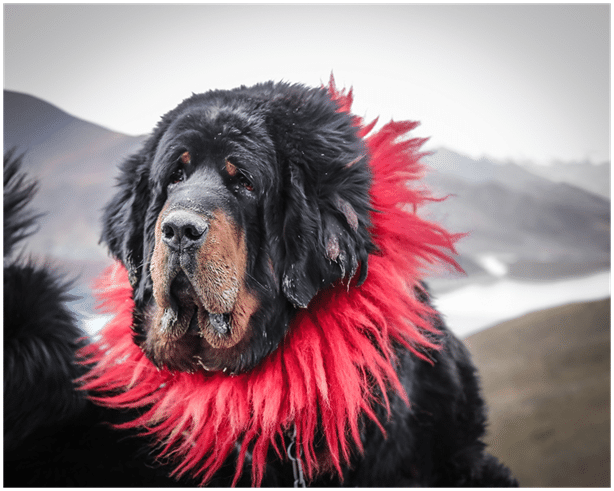Tibetan Mastiffs are known for their impressive size and strength, so it is essential to know what foods they should eat to maintain a healthy and balanced diet. So, what should Tibetan Mastiffs eat?
Tibetan Mastiffs are primarily meat-eaters, and consume a lot of protein. They prefer eating mainly animal-based products and need large amounts of food to help them maintain their high energy levels.
We explore the different types of foods that should either be eaten or avoided, along with potential health concerns to be aware of when managing a Tibetan Mastiff’s diet.
What Do You Feed a Tibetan Mastiff?
Tibetan Mastiffs are carnivores and primarily eat meat. They can eat a variety of animal products, including beef, pork, lamb, chicken, rabbit, and fish. Some Tibetan Mastiffs also consume dairy products and eggs.
While it is not necessary to strictly feed your Tibetan Mastiff a diet of only meat, it is important to ensure that they are getting enough protein in their diet.
You can do this by feeding them high-quality food that contains a high percentage of animal-based proteins.
Alternatively, you can also cook meats for your dog yourself and supplement their diet with vegetables and fruits.
This is a good option for owners who want to have more control over their dog’s diet and nutrition.
How Much Food Should I feed My Tibetan Mastiff?
When it comes to feeding your Tibetan Mastiff, there are a few things you should keep in mind.
First, make sure that you are providing them with enough food to meet their energy needs. Puppies and young dogs, in particular, require a lot of food to support their rapid growth.
Secondly, don’t forget to include supplements in their diet if needed. This is especially important for Tibetan Mastiffs that are not getting enough protein from their regular diet.
Finally, make sure that you are providing them with fresh, clean water at all times. This will help keep them hydrated and prevent health problems down the road.
How Much Does a Tibetan Mastiff Eat A Day?

Tibetan Mastiffs are large dogs, and as such, they require a significant amount of food to maintain their energy levels. Depending on the size and activity level of your dog, you should expect to feed them anywhere from 2-6 cups of food per day.
It is important to monitor your dog’s weight and adjust their diet accordingly; overfeeding can lead to excessive weight gain and obesity, which can be very harmful to a dog’s health.
Feeding your Tibetan Mastiff the right amount of food will help keep them happy and healthy!
Can a Tibetan Mastiff Eat Raw Meat?
It is not recommended to give a Tibetan Mastiff raw meat as their diet. It is better to feed them commercial dog food or home-cooked food.
If you must give them raw meat, make sure it is boneless and well-cooked. You can also give them small amounts of raw vegetables.
The issue with feeding your Tibetan Mastiff raw meat is that it may contain bacteria that can make your dog sick.
If the meat is not properly cooked, it could also contain parasites that could infect your dog. It is always best to speak with your veterinarian before feeding your dog any type of raw meat diet.
Is Raw Food Best for a Tibetan Mastiff?
Raw food of diet consists of mostly unprocessed, fresh foods including meat, fruits, and vegetables.
Some proponents of the raw food diet say that it can help improve digestion, increase energy levels, and promote a healthy coat and skin.
Some people also believe that a raw food diet can help prevent health problems like obesity, heart disease, and cancer.
There is no scientific evidence to support these claims, but some pet owners swear by the benefits of feeding their Tibetan Mastiffs a raw food diet.
If you are considering switching your dog to a raw food diet, it is important to do your research and consult with a veterinarian to make sure that your dog is getting the appropriate nutrients.
There are many commercially available raw food diets for dogs, or you can create your own using fresh, unprocessed ingredients.
When feeding a raw food diet to a Tibetan Mastiff, it is important to remember that they are a large breed and need a lot of calories and protein.
They also require plenty of moisture, so be sure to include lots of fresh fruits and vegetables in their diet, as well as raw meaty bones.
It is also important to monitor your dog’s stool to make sure that they are digesting their food properly.
If you notice any changes in your dog’s health or behavior, stop feeding them a raw food diet and consult with a veterinarian.
How Important is Gut Health for Tibetan Mastiffs?

Gut health is very important for Tibetan Mastiffs. A healthy gut means a healthy dog, and a healthy dog is a happy dog.
The gut is responsible for digesting food, absorbing nutrients, and eliminating waste. It is also home to 70% of the immune system. Therefore, it is vital that the gut is in good working order.
There are many things you can do to keep your dog’s gut healthy. One of the most important is to feed them a high-quality diet.
Make sure the food is made with fresh, all-natural ingredients and does not contain any artificial additives or preservatives.
You should also feed your dog plenty of fresh fruits and vegetables. These are excellent sources of fiber, which is important for gut health.
In addition to a healthy diet, regular exercise is also important for gut health. By ensuring your dog’s exercise requirements are met will help keep their digestive system moving and prevent constipation.
It also helps to reduce stress, which can have a negative impact on gut health.
Finally, it is important to keep your dog’s environment clean. Make sure to clean up any spilled food or water and pick up any waste immediately.
This will help to reduce the risk of infection and gastrointestinal upset.
If you are concerned about your dog’s gut health, consult your veterinarian. They can recommend specific dietary and lifestyle changes that will help to keep your dog’s gut healthy and happy.
How Much Protein Does a Tibetan Mastiff Need?
Tibetan Mastiffs need to eat about 22 grams of protein per day. This can be found in dog food that is specifically made for mastiffs, or in other high-protein dog foods.
Meat, eggs, and dairy are all good sources of protein for dogs.
Some people also choose to give their mastiff raw meat as a source of protein. While this is not necessary, it can be a healthy option for dogs that are able to digest it properly.
What Food Should a Tibetan Mastiff Not Eat?
Tibetan Mastiffs should not eat any food that is high in fat, as this can lead to health problems.
There are also a number of foods outlined below, which should be avoided at all costs to ensure your Tibetan Mastiff remains healthy. These include:
- Chocolate
- Onions
- Garlic
- Grapes
- Raisins
- Macadamia nuts
- Any type of avocado
- Tomatoes
- Raw potatoes
- Rhubarb leaves and stems
Can a Tibetan Mastiff Eat Table Scraps?
Yes, Tibetan Mastiffs can eat table scraps. However, it’s important to only give them small amounts of food and not to overfeed them. Table scraps should not make up the majority of their diet.
Instead, they should be given high-quality dog food that is specifically designed for mastiffs. This will ensure that they get the nutrients they need to stay healthy.
Does Diet Affect the Health of a Tibetan Mastiff?

While there are many factors that contribute to the good health of the Tibetan Mastiff, diet is one of the most important.
Like all dogs, Tibetan Mastiffs need a balanced diet that provides them with the nutrients they need to stay healthy.
A good diet for a Tibetan Mastiff includes plenty of protein and a mix of other nutrient-rich foods like fruits, vegetables, and whole grains.
Dogs also need plenty of fresh water to stay hydrated, so make sure your Mastiff has access to plenty of clean water at all times.
When it comes to feeding your Tibetan Mastiff, it’s important to remember that dogs are opportunistic carnivores and need a diet that is high in animal protein.
This means that you should feed your dog mostly meat-based diets with some fruits and vegetables mixed in.
While there are many different types of commercially available dog foods on the market, it’s always best to consult with your veterinarian to find the best diet for your individual dog.
Some dogs may have allergies or other medical conditions that require a special diet, so it’s important to work with your vet to find the best food for your Mastiff.
Are Dog Supplements Good for Tibetan Mastiffs?
Supplements can be a great way to ensure that your dog is getting all the nutrients they need to stay healthy and active. Some common supplements that may be beneficial for Tibetan Mastiffs include:
Fish oil supplements
These are high in omega-3 fatty acids, which are beneficial for a variety of health issues. They can help improve joint health, reduce inflammation, and promote a healthy coat.
Multivitamin supplements
A multivitamin can provide your dog with essential vitamins and minerals that they may not be getting enough of in their diet. This can help improve overall health and well-being.
Joint supplements
If your dog is starting to show signs of joint pain or stiffness, a joint supplement can be helpful. Whilst Tibetan Mastiffs should eat a healthy diet, adding joint supplements to their routine can help reduce inflammation and improve joint health.
Before giving any type of supplement to your dog, you should always consult with your veterinarian first. This is to ensure that the supplement is right for your dog and will not cause any adverse side effects.


